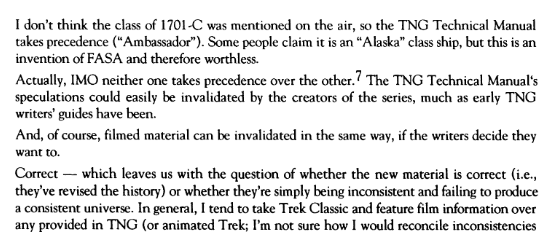| Type | JournalArticle |
|---|---|
| Date | 1994 Spring |
| Volume | 55 |
| Number | 1 |
| Tags | nonfiction, Star Trek, religion |
| Journal | Sociology of Religion |
| Pages | 27--51 |
Star Trek Fandom as a Religious Phenomenon
Perhaps due to its age, this article says little of particular interest, and much of what it says might be applied to many other fandoms, as well. In a way, that's a strength of Jindra's argument: if the kinds of things that Jindra describes really are something like religious activity, we wouldn't expect Trek to have an exclusive license to them. In another way, it's a weakness, because it sounds (to my 2020 ears) like a lot of "fans have conventions where they meet up with other fans" and "fans talk about the events of the show and call it canon, just like religions", and none of that sounds like interesting observations.
I do like that Jindra exhibits some text from Usenet to demonstrate how fans talk about Trek, but he annoyingly fails to attribute it. Additionally, when I saw this (p. 44):

I thought to myself that sounds like two people having a discussion, and so I looked around, and, indeed, it is misleadingly formatted. It is a conversation between two parties. The first and third paragraphs are from Matt Hucke, and the second and fourth are from Michael Rawdon. Probably the precise source of the exchange was 1992Feb25.191745.15958@spool.cs.wisc.edu.
Jindra comments:
Later in this article, I will give examples of postings on these nets, and show how a process of systemization occurs involving the formation of unified beliefs and practices in an ongoing process of forming and maintaining community.
This I find interesting. I have considered for some time that one substantial effect (or perhaps goal) of fanfiction and other fan work is the collective working out of ideas about the canon–a process of building consensus by trying out variations to see which resonate with the authors and readers, which results in a general shared understanding.
Jindra also compares Trek fandom with nationalism:
Or, comparing with Benedict Anderson's "imagined communities" of nationalism, the ST imagined communities are usually explicitly non-nationalistic, finding their identity not in ethnicity but in adherence to a vision of the future.
This sounds like an interesting idea. Anderson presented it in Imagined Communities. I'll have to read it and see what value it has.
Abstract
This essay is an ethnographic exploration of Star Trek fandom. Rather than the more common textual analyses of the program, this article examines the history and practice of the fans themselves, on computer networks, at conventions and in tourism, in "Starfleet" fan clubs and in fan literature. All these fan activities construct and add to the alternative universe of Star Trek while also connecting it with the present. At a time when scholars are finding religion in nonconventional locations, I argue that Star Trek fandom is one of these locations. Star Trek fandom involves a sacralization of elements of our culture, along with the formation of communities with regularized practices that include a "canon" and a hierarchy. Star Trek fandom is also associated with a popular stigma, giving fans a sense of persecution and identity common to active religious groups.
| Name | Role |
|---|---|
| Michael Jindra | Author |